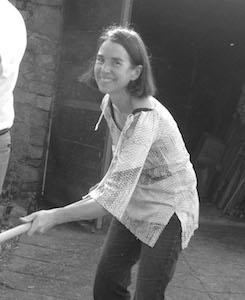Marguerite Kahrl

Marguerite Kahrl is an artist and permaculture designer with two decades of design experience, applying the principles and philosophy of permaculture to living environments and social art projects. In her sculpture, she approaches systems thinking from a playful angle, manipulating symbols, metaphor, and diverse media in order to encourage social engagement. Many of her artistic projects are ‘on site projects’, built as prototypes for activating change.
Her exhibition Piccole Invasioni Malthusiane is currently on view at Museo Ville Croce in Genoa. This July she will exhibit together with Marjetica Potrč at PAV in Turin. Kahrl’s work has been exhibited internationally, including Savages, Ningbo, China and Turin Italy, 2014; Seeds of Winterslag, Manifesta 9, Genk, Belgium, 2012; Common Ground: Projects for the Lagoon, Fondazione Bevilacqua La Masa, Venice, Italy, the Museum of Contemporary Art , Tucson, Arizona, 2010, Boulder Museum of Contemporary Art, Colorado 2007; Dsegni, Fondazione Sandretto Re Rebaudengo, Torino, Italy 2004.
Wind Energies, prototypes for cultural change
Using the design processes of permaculture and participatory design I reach across disciplines to articulate imaginable solutions for complex problems. For example during a residency at the studio for interrelated media at the Massachusetts college of Art in 2008, I co-designed mesh networked radiation monitors for eventual use by citizens groups around nuclear power plants.
In 2010 Marjetica Potrc, myself and students from IUAV prototyped a Rainwater Harvesting system in the Venice Lagoon. The premise of ‘Rainwater Harvesting Project at a farm on St. Erasmo Island’ was to reach across disciplines of art and architecture to imagine the future of the Venetian lagoon as a sustainable environment.
A project I am presently working on is Con MOI, an informal group of Italian and migrant citizens who practice real solidarity, strengthening social and human bonds through sharing food, time and mutual attention. We practice recovery and redistribution of surplus food that can no longer be sold, without any exchange of money. We are defining a new way of considering the community and turn to retailers, markets, medium and large retail facilities, restaurants, communities and individuals to collect food surpluses and redistribute the territory.
Recommended readings
-
Coming Back to Life: The Updated Guide to 'The Work That Reconnects', Joanna Macy, Molly Brown, Foreword by Matthew Fox
-
Undermining - A Wild Ride Through Land Use, Politics, and Art in the Changing West, Lucy R. Lippard
-
Thoughtless Acts?: Observations on Intuitive Design, Jane Fulton Suri, Ideo
Statements / Questions
-
How can we meet human needs while increasing ecosystem health?
-
How can a sustainability debate be conducted from the perspective of the arts?
-
Do the needs of asylum-seekers excessively burden existing communities?